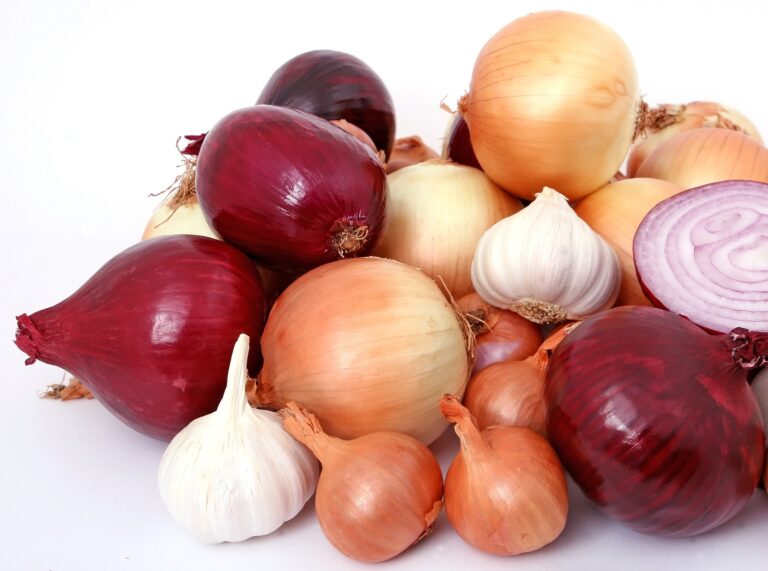All In for Onions

The illustrious onion (Allium cepa L.) belongs to the Allium family along with chives, garlic, and leeks. Incredibly versatile, they have been widely traded and used as a delicious food and ingredient by almost all cultures. Onions come in a spectrum of colors like red, yellow, and white, and can be eaten raw, grilled, cooked, or roasted.
Highly Recommended
Onions have a long history – in fact, one of the longest! Thought to have originated in central Asia, onions may be one of the earliest cultivated crops. They were used as funeral offerings to pharaohs in Ancient Egypt, promoted in the medical treatise the Charaka Samhita, and eaten by Ancient Greek athletes to prepare for the Olympic Games.
So what are these health benefits? In conjunction with other lifestyle factors, eating onions can reduce your risk of cancer, heart disease, and strokes.
The Function of Flavonoids
Onions contain an abundance of flavonoids, a class of plant pigments that are important for eliminating free radicals. Free radicals are unpaired electrons that can wreak havoc in the body, causing mutations, damaging cell membranes, and increasing your risk of disease. However, flavonoids stabilize these free radicals by providing them with an extra electron. As a result, onions protect against oxidative stress!
Keep an eye out for color! Red and yellow onions contain more flavonoids than white ones.
The Wonders of Quercetin
Many of onions’ health benefits are linked to their main flavonoid, called quercetin. Taking its name from the Latin word quercetum (“oak forest”), quercetin has a variety of health benefits, including antibacterial effects and preventing heavy metal and pesticide poisoning.
Anti-Cancer
Quercetin can modulate a multitude of cell signaling pathways and regulate the expression of tumor suppressor genes. It inhibits tumor growth and metastasis and has been studied with cancers of the pancreas, breast, prostate, lung, and colon.
One study found that quercetin induced cytotoxicity in leukemic and breast cells, with minimal effects on normal cells. It also induced tumor reduction and increased the lifespan of tumor-bearing mice. As such, onion has great therapeutic potential in the battle against cancer.
Antibacterial
Quercetin has broad-spectrum antibacterial activity, blocking viral entry and inhibiting enzymes required for viral replication. Onion extracts have been shown to be effective against Salmonella enterica, Escherichia coli, and Staphylococcus aureus, and studies have even been conducting investigating quercetin’s potential use against COVID-19.
Cardiovascular
Onion extract exhibits antiplatelet activity, preventing the buildup of fatty acids on the artery walls in the condition called atherosclerosis. The buildup of this plaque blocks blood flow; thus, quercetin protects against a blood clot, stroke, or heart attack.
Neuroprotective
As a result of combating oxidative stress, quercetin can also protect against neurodegeneration and mitochondrial damage. One study found that quercetin (with memantine) improved the learning ability and spatial memory of rats, which has implications for improving the symptoms of Alzheimer’s disease.
That’s enough about quercetin! Organosulfur compounds are responsible for onions’ sharp taste and smell. However, before you blame them, save your tears – onion extract has been shown to prevent inflammatory processes leading to asthma.
Don’t Cry About It
Want to keep a dry eye while cutting onions? One tip is to chill them for 30 minutes before slicing off the top. Peel the outer layer and leave the root intact, as this part has the highest concentration of syn-Propanethial-S-oxide, the compound that makes you cry!
On Your Own
Try onions today by incorporating them into your salads, omelets, sandwiches, and guacamole! And don’t forget, you get the most nutrients by eating them raw.
Go all in for onions today!
